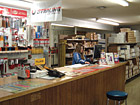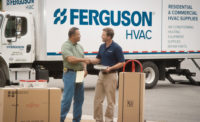“As of November 2007, distributors were collectively up 1.7 percent. Considering 2006, which was probably the best year ever, it ain’t bad,” said Boyd. “People keep saying it’s bad, but it’s really not. One year doesn’t mean anything. If you went out and spent a lot of money based on your 2006 sales, shame on you. You need to do that two or three years in a row, then you may go spend some more money.”
While sales may have stayed even for most distributors, they are uncertain about what 2008 may bring. A slowing housing market, tightening credit standards, and rising energy costs are causing some to think about raising prices or reconfiguring their inventory. Another major issue facing distributors is their aging workforce, which will cause even greater challenges in the years to come.

Educating and training employees should be high on the list of distributor management. HARDI makes it easier by offering a number of classes for all types of employees. Attracting new people to the business is going to be a big challenge for distributors, especially as their older workers begin to retire.
NEW OPPORTUNITIES
“Our economy is built around people spending money. That hasn’t declined, it’s still growing. It’s just not growing as fast as everyone wants it to,” said Boyd. “Distributors have to position themselves to take advantage of the opportunities that do present themselves.”The commercial market is one of those opportunities. While many analysts predict that the commercial construction market may start to taper off in 2009, they believe that 2008 should be another strong year. “The 2008 construction forecast is generally positive and many sectors of the construction industry will remain healthy, despite the continuing drag of the housing downturn,” said Heather Jones, construction economist for FMI’s Research Services.
“In terms of trends, the aging of the population, immigration, and deteriorating infrastructure will drive much of this growth. The health care, public safety, office, and transportation segments will see the strongest growth in 2008.”
One particular opportunity within the commercial market may be multi-family housing units, which some are expecting to increase due to the subprime mortgage problems. People still need places to live, and if they can’t afford houses, apartments will gain in popularity. Boyd noted that most distributors will probably not carry less residential heating and cooling equipment as a result of the strong commercial market, although they will probably stock up on more rooftop units and other commercial HVAC equipment.

Speaking of replacement, Boyd predicts the slowing economy will result in more repairs, which means distributors will be selling more replacement parts. “There’s a time and a place to replace every system, but repairing the system should always be an option,” said Boyd.
“The economy is slowing. Money is tighter. Just the sheer magnitude of the cost difference between repairing a unit and replacing the whole system is going to drive replacement parts. The contractor who doesn’t offer that solution is not doing his end user justice. Technicians are going to have to be better trained, more qualified, so they can determine why the unit failed in the first place and how to fix it.”
LINGERING CONCERNS
The slowing housing market is probably the first big issue that comes to mind when thinking about the challenges facing the HVAC industry. “I think 2008 is going to be a tough year for most people when it comes to the housing slump,” said Boyd.“I think there will be marginal builders who go under, and they’ll take their contractors with them. Distributors need to be monitoring their credit policies and pay attention to what’s going on there.”
Rising fuel costs have also affected everyone, but distributors may be harder hit due to their need to deliver equipment to job sites. Boyd noted that some distributors have started charging delivery fees to offset the rising cost of fuel, but that it seems to be more of a regional issue.
Basically, those distributors located in large metropolitan areas in the Northeast and Midwest are more likely to charge for delivery because their trucks can be stuck in traffic for long periods of time. Those who aren’t charging additional fees for delivery are just passing it along through price increases.
“We’ve been fortunate enough to have some price increases to help cover those costs,” said Boyd. “Distributors, in general, welcome price increases - as long as they’re industry-wide. We handle inventory. Any time there’s a price increase and we’re able to pass that along, we make more money. We need those dollars for our ever increasing overhead.”
A bigger issue facing distributors is their aging workforce. “Distributors have got to address the Baby Boomers leaving and the next generation that’s coming in. Our workforce is going to retire on us, and that’s going to hit us hard because there’s a lot of knowledge in our industry,” said Boyd. “We need to worry about investing in our young people - educating them and training them. We have to maintain that value in the chain.”
The Home Study Institute is one of the ways that HARDI is responding to the problem. The Institute provides up-to-date training courses for HVACR industry employees outside the confines of a physical classroom, so there are more opportunities for them to learn and move up inside an organization. “We also offer all different kinds of workshops, for outside sales managers, countermen, managers, you name it. It’s a good way to continue to enhance our people.”
The Home Study Institute and the other workshops offered by HARDI are a good way to give employees the tools they need to do their jobs better. Boyd has a theory about how this ultimately helps those in the distribution industry: “As the president of HARDI, my goal is pretty much the same as it is for AC Supply and that is to give its members the tools they need to run faster and jump higher and have fun doing it. I call that the Keds theory. Give a kid a new pair of Keds, and he will think he can run faster and jump higher, and the joy that shows on his face will keep him with you forever.”
Publication date:03/24/2008







